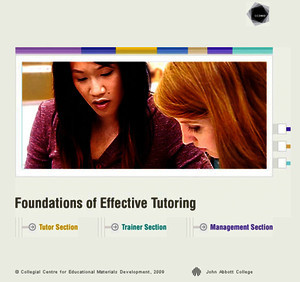Foundations of Effective Tutoring
In many colleges and universities across the country, peer tutoring provides a corner-stone to academic support services. Foundations of Effective Tutoring was developed and produced by the CCDMD (Centre Collegial de Developpement de Materiel Didactique). It came into being because Brenda Rowe, Project Manager and Chairperson for the Learning Center at John Abbott College (JAC), was searching for resources online and found that none of the Anglophone CEGEPs had anything on the subject. Learning Centers did get help from each other, but except for some material from the U.S., there was definitely a void. So Brenda got letters of support from various departments at JAC as well as from other CEGEPs to submit a proposal to the CCDMD that brought this unique and important resource into existence.

Brenda Rowe & Elizabeth Clarke
Jeannine Ryser was looking for part time work in her field. She is a self-described freelance academic who seeks interesting projects in diverse areas of education including: training, advising, research, student support services, and teaching online as well as in the classroom. Scanning CEGEP sites from her home in Mont Tremblant, she saw an ad for the position at John Abbott, was interviewed and became the author of the project. Jeannine was hired because she had experience in training, tutoring, and working with diverse student populations, particularly international students and students with learning disabilities. Jeannine took over the early work done by Suzanne Danningburg who moved to Marianopolis College shortly after her start on the project.
Once at John Abbott, Jeannine worked to understand the goals as outlined in the grant and adapt workshop materials accordingly. Jeannine felt there were three key factors to integrate into the training: Audience, Design and Content. The audience was two-fold: materials needed to be created for both trainers and prospective tutors. The material would have to support trainers with little or no experience. So a variety of documents were provided to enhance workshop facilitation in addition to the content materials aimed at improved tutoring services.

Welcome Page of the site.
The next key element was design. Jeannine thought that flexibility was essential so that trainers could tailor workshops to individual schools’ training needs. Trainers can select which of the five modules are most relevant for their prospective tutors and they can also select/delete activities within each module.
The last key element was content. The approach to the content was based on “student-centered” learning where tutee ideas and questions form the basis for tutorial. Consequently, skill development for prospective tutors focuses on areas such as listening, asking effective questions, adapting to diverse learning styles, and empowering the tutee to learn more independently. Specific goals of the training include:
- Defining Tutor Role
- Implementing Effective Tutorial Format
- Exploring and Practicing Effective Tutoring Techniques
- Enhancing Communication Skills
- Understanding Differences related to Multiple Intelligences, Learning Disabilities, and Social Group Diversity
- Problem Solving
- Cultivating Metacognition
- Maintaining Academic Integrity
Five modules, between two and three hours each, have been designed to help develop a solid set of competencies for students to effectively tutor their peers. These include:
Module 1: Tutor Role, Tutorial Format, and Tutoring Techniques
Module 2: Communication: Active Listening, Effective Feedback, Non-Verbal Cues
Module 3: Understanding Differences: Multiple Intelligences and their Applications; Learning Disabilities
Module 4: Understanding Differences: Social Group Memberships and Learning
Module 5: Metacognition; Plagiarism, Citations, and Web-site Verification; Tutorial Evaluations; Training Workshop Evaluation

The photo is from one of the videos specially created for the material.
Each module is a treasure chest of information. There is a trainer guide as well as handouts which cover workshop content. An experiential activity, usually a role play, is included, and there are video clips which come with observation sheets. The student watches the video and answers the questions, while the trainer has a corresponding analysis for each video clip. For trainers who don’t have the time for this assignment, there is a video with the training points highlighted on screen. An effort was made to crystallize concepts into readily accessible and practical materials which directly relate to tutoring situations.
Elizabeth Clarke has been the coordinator of the Learning Center tutoring program and the ESL tutors at JAC for the last two years. On February 25, she met with the twenty-eight students who have been trained this semester using Foundations of Effective Tutoring, The online training allows everyone to do it on their own time and come to a general meeting to discuss what they have learned as well as what worked for them and to share this knowledge as a group. Among the questions that were discussed were whether the modules were too long or too short so that they could be updated. It seems as if they are working well. Comments from other CEGEPs have also been very positive and the English Department and the Math Department will probably be using the resource to train their tutors for next semester.
Foundations of Effective Tutoring is an important resource and its widespread use will hopefully improve student academic outcomes through more effective tutoring sessions. Because it has made a difference in the colleges where it is being used, everyone involved in its development would like to see its implementation throughout the Anglophone college network and beyond. Véronica Gill the project manager from CCDMD has been an important contributor to the development of this resource. Chris Corno of Champlain College also added valuable insights. Click here to connect to the CCDMD page for the resource and share your opinions and experiences about it with your colleagues using our Comments feature.

